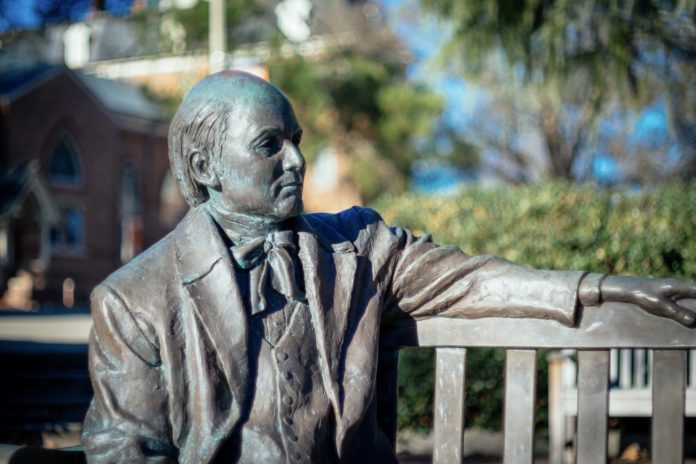MACON – Existing state law and policy in Georgia creates crippling barriers for ex-offenders who try to get their lives back on track, increasing the rate of recidivism and producing unreasonable social and economic strains on Georgia taxpayers, according to a new book published by Mercer Law School examining the issue.
The book, Collateral Consequences of Arrests and Convictions: Policy and Law in Georgia, is the first comprehensive study of its kind to examine the impact of state law and policy on ex-offenders reentering society after serving time. Among the central findings of the study is that the dissemination of arrest and conviction records creates unreasonable consequences for ex-offenders seeking employment, housing, public assistance and the right to vote. The result, the study suggests, is a state system that produces unavoidable roadblocks for ex-offenders, making recidivism more likely. Collateral Consequences provides nonprofit agencies, volunteer lawyers and others the legal background and authorities for the representation of clients who have these problems.
The study comes on the heels of a recent national study by the Legal Action Center in Washington, D.C., that ranked Georgia as the third worst state in the country for the number of legal barriers facing people with criminal records. Compounding this problem is the fact that, as of June 30, 2005, Georgia had the second highest incarceration rate in the country. The overall impact of these barriers to reentry for ex-offenders – or even those simply arrested but not convicted – constitutes a significant social and economic drain on the country and particularly the state of Georgia, the study suggests. The Georgia Department of Corrections has estimated that reducing the recidivism rate in Georgia by 1 percent would save Georgia taxpayers $7 million a year.
“This book systematically explores and seeks solutions to the most serious problem facing the American penal system today – reintegration of inmates into society when their terms are completed,” said Charles A. Shanor, professor at Emory University School of Law.
“This study deserves careful bipartisan action by policymakers looking to avoid a scandalous waste of lives and to reduce the enormous costs of incarceration.”
Funded by the Georgia Bar Foundation through a grant to Mercer Law School, the study was written by volunteer lawyers who practice at two of Atlanta’s most prestigious law firms: H. Lane Dennard Jr, a retired litigation partner at King & Spalding, and Patrick C. DiCarlo, a partner at Alston & Bird. Other volunteer lawyers at both law firms were also heavily involved in the preparation of the book. Law students at both Mercer Law School and Emory Law School provided critical research for the book, which was published by Mercer Law School under the direction of Tim Floyd, director of Mercer’s Law and Public Service Program.
The book takes particular aim at how criminal records are recorded and shared in Georgia. According to the study, when someone is arrested, even without a conviction, a record of that arrest is maintained by the Georgia Crime Information Center. The GCIC is a division of the Georgia Bureau of Investigation charged with creating a statewide, central repository for the collection, maintenance and dissemination of all local law enforcement and criminal justice records. These criminal histories are made available to public and private entities based on so-called “Purpose Codes.” For example, some level of information may be sent with consent to an ex-offender’s prospective employer and/or public housing authorities.
The study suggests that the system is awash with serious problems, among them:
1. Studies indicate that records of arrests are not timely updated with dispositions in the cases. This is particularly important when arrests are thrown out or do not result in convictions;
2. The criminal histories go back 20 years or more; and
3. The language used to characterize the arrest may exaggerate the seriousness of the offense.
“When decisions made in areas like public housing and employment are based on incorrect and /or incomplete histories, it has a devastating effect on the ex-offender,” the study suggests.
Doug Ammar is a lawyer and executive director of the Georgia Justice Project, a non-profit organization in Atlanta whose mission is to ensure justice for the indigent criminally accused and to assist them in establishing crime-free lives and becoming productive citizens. The organization started an initiative called “The Coming Home Project” to specifically address the issue of civil consequences after a criminal arrest or conviction. The book, in part, was designed to provide objective research and data to inform initiatives such as “The Coming Home Project.”
“Many individuals who relapse and return to the cycle of poverty and crime do so out of desperation and frustration with the multitude of structural barriers awaiting them upon their release from prison,” Ammar said.
Larry D. Thompson, former U.S. Deputy Attorney General and now senior vice president of government affairs and general counsel and secretary for PepsiCo Inc., said the book should inform lawyers and legislators alike.
“This book raises critical issues that face both the state of Georgia and our country,” Thompson said. “It should provide legal background and authorities for the representation of clients, especially poor clients, as well as the identification of issues that should be considered by courts and legislatures.”
For more information on the study, contact Tim Floyd, director of the Law and Public Service Program at Mercer Law School, at (478) 301-2631. To order copies of the book, call Mercer Law School at (478) 301-5000.
-30-










